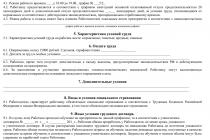The contract designer is available to you. Just log in to the 1C-Start portal and create your employment contract in 11 minutes. More detailed material on employment contracts is below.
An employment contract is the main document confirming that the parties have entered into an employment relationship between themselves, the characteristics of which are given in Art. 15 Labor Code of the Russian Federation. We considered other options for interaction between the employer (customer) and employee (performer)
The essence of labor relations is that one personally performs a specific labor function for an agreed fee under the control of the employer, and the employer provides payment, appropriate working conditions and social guarantees provided for by law. Please note that individual entrepreneurs must fulfill the same responsibilities as an employer as an organization, with a few exceptions (for example, severance payments due to staff reduction).
Under an employment contract, an employee has the maximum possible rights and guarantees, and from the employer such an agreement requires not only timely payment and the creation of working conditions, but also the execution and storage of many personnel documents. We propose to consider in detail the documentary procedure for registering an employee as a staff member.
Mandatory individual employment contract
An employment contract must be concluded individually with each employee; when hiring, you cannot do it only with an order or an entry in. In reality, situations often arise when an employee actually works within the framework of an employment relationship, but an employment contract has not been concluded with him. This situation is a direct violation of labor laws.
According to Art. 67 of the Labor Code of the Russian Federation, upon actual admission of an employee to work, the employer is obliged to draw up an employment contract with him in writing no later than three working days from the date of commencement of work. If the employment contract was not drawn up in writing, then it is still considered concluded from the day when the employee began work with the knowledge or on behalf of the employer or his authorized representative.
If a situation arises where an employee actually works within the framework of an employment relationship without concluding an employment contract, and the employer claims that he does not know about this and refuses to recognize the relationship with this employee as labor, then the employee must still be paid for the time actually worked or completed work. Responsibility for this violation (even criminal) is borne by the person who actually allowed the employee to work without the knowledge of the employer.
Of course, it’s no secret that in Russia a large number of people work unofficially. Last year, the Government missed 20 million able-bodied citizens from the official labor market. Of course, these people have sources of income, and not all of them are illegal entrepreneurs. A significant part of them are illegal workers for whom employers do not pay insurance premiums and do not withhold income tax from them. It is easier for the state to solve this problem by holding employers accountable, so it is very likely that labor legislation will continue to become stricter.
Since January 1, 2015, Article 5.27 of the Code of Administrative Offenses of the Russian Federation on liability for violation of labor legislation has been in effect in a new edition, according to which evasion or improper execution of an employment contract or a conclusion that actually regulates labor relations between an employee and an employer entails the imposition of an administrative fine:
- for persons carrying out entrepreneurial activities without forming a legal entity, from five thousand to ten thousand rubles;
- for officials in the amount from ten thousand to twenty thousand rubles;
- for legal entities - from fifty thousand to one hundred thousand rubles.
The employment contract must necessarily indicate the information and conditions provided for in Article 57 of the Labor Code of the Russian Federation. Usually mandatory information fit into the preamble (header) of the employment contract, and these include:
- name of the employer-organization or full name of the employer - individual;
- Full name of the employee;
- employer's tax identification number;
- information about documents proving the identity of the employee and the employer - an individual;
- information about the employer’s representative who signed the employment contract and the documentary basis of his powers;
- place and date of conclusion of the employment contract.
As we can see, this information is necessary in order to identify the parties to the employment contract, that is, that a specific employee starts working for a specific employer.
As for the terms of the employment contract, they can be divided into mandatory and voluntary; both are specified in Article 57 of the Labor Code of the Russian Federation. TO mandatory conditions relate:
- Place of work. What is considered “place of work”? A simple question that can sometimes be confusing. There is no such definition in the Labor Code of the Russian Federation; it only states that if an employee is hired to work in a separate division of an organization (branch, representative office) located in another area, then its location must be indicated. In practice, the place of work in the text of the employment contract is specified in detail, for example, as follows: “Office of Lira LLC, located at the address: Moscow, st. Oktyabrskaya, 30.” If the employer is an individual entrepreneur, then the place of work is indicated as IP “Ivanov P.R.” with the addition of the address of the store, pavilion, warehouse, etc. In the case where the employee is not tied to work at a specific address, for example, is a sales representative, a rotational worker, or travels to different sites, then you can only indicate the name of the LLC or individual entrepreneur, adding that the work is of a traveling nature.
- Labor function. Here the Labor Code of the Russian Federation gives a clear definition: work according to the position in accordance with the staffing table, profession, specialty indicating qualifications, or a specific type of work entrusted to the employee.
- Work start date. If a fixed-term employment contract is concluded, then it is also necessary to indicate its validity period and the reasons why the fixed-term contract was concluded. For example, like this: “This employment contract is fixed-term and is concluded on the basis of Article 59 of the Labor Code of the Russian Federation until the temporarily absent permanent employee returns from parental leave.”
- Terms of remuneration. Here they indicate the size of the tariff rate (salary), additional payments, allowances and incentive payments. If paid to a payment card, then this should be indicated in (if there is one) or an individual employment contract.
- The regime of working hours and rest time must be prescribed only if for a given employee it differs from the general rules of internal labor regulations.
- Guarantees and compensation for work with harmful and (or) dangerous working conditions, if the employee is hired in such conditions. This may include increased wages, additional paid leave, reduced working hours, therapeutic and preventive nutrition, early retirement, periodic medical examinations and preventive treatment.
- Conditions that determine the nature of the work (if any), such as mobile, traveling, on the road, etc.
- Working conditions in the workplace. For example: “Working conditions at the employee’s workplace, according to the results of certification dated February 10, 2013, were recognized as safe.” In 2014, workplace certification was replaced by a special assessment of working conditions; if it has already been carried out by the employer, then it must be referred to.
- Conditions on compulsory social insurance of the employee. This refers to the payment of mandatory insurance contributions to the Pension Fund, Compulsory Medical Insurance Fund and Social Insurance Fund for the employee. This condition can be expressed by the phrase: “The employee is subject to all social benefits, guarantees and compensation established by the legislation of the Russian Federation and local acts of the employer.”
If mandatory information or conditions were not included in the text of the employment contract, then this cannot be a reason to recognize it as not concluded or terminated. In this case, the Labor Code requires that the contract be supplemented, while the missing information is entered directly into the text, and the missing conditions are supplemented in the form of a written annex or additional agreement of the parties.
As additional conditions, you can specify other conditions that should not worsen the employee’s situation compared to the norms of current legislation. This may be a condition on non-disclosure of commercial or official secrets, on the employee’s obligation to work for a certain period after training (if it was carried out at the employer’s expense), on additional insurance for the employee, and on improving the social and living conditions of the employee and his family members.
Among the additional conditions, it stands out test condition. As we can see, an employment contract imposes strict requirements on the employer to respect the rights of the employee, including limiting the possibility of terminating such a contract. The probationary clause still gives the employer the opportunity to terminate the employment relationship with an employee whose business qualities do not meet the requirements of the position, specialty, or qualifications.
The possibility of testing is provided for in Articles 70 and 71 of the Labor Code of the Russian Federation, and this means checking the employee’s compliance with the assigned work. Indicate the condition of testing with mutual consent of the parties; in addition, such a condition is unacceptable for:
- pregnant women and women with children under one and a half years old;
- elected positions or persons elected by competition;
- workers under the age of eighteen;
- those who first entered work in their specialty within one year from the date of receiving secondary vocational or higher education;
- persons invited to work by way of transfer as agreed between employers;
- if the employment contract is concluded for a period of up to two months.
The probationary period cannot be more than three months, and for heads of organizations and separate divisions, deputy managers, chief accountants and their deputies - six months, unless another period is specified by federal law. If the employment contract is concluded for a period of two to six months, then the probationary period cannot exceed two weeks. The probationary period does not include those periods when the employee was actually absent from work, including due to illness.
The result of the test may be a written warning to the employee about termination of the employment contract, indicating the reasons why he was found to have failed the test. The employee has the right to appeal such a decision in court. If the probationary period has expired, and the employee actually continues to work without receiving such a warning, then termination of the employment contract is allowed only on a general basis.
An employee can also inform the employer in writing that a particular job is not suitable for him. The deadline for such communications from the parties to the employment contract is no later than three days before its termination.
Duration of the employment contract
An employment contract can be concluded for an indefinite period or for a certain period (no more than five years). Agreements indicating a validity period are called, but they can be concluded only in certain cases provided for in Article 59 of the Labor Code of the Russian Federation:
- for the period of absence of a permanent employee;
- for temporary (up to two months) or seasonal work;
- when hiring in organizations that were created for a certain period or for a specific job;
- internship, vocational education, industrial practice;
- for an elected position or as part of an elected body and in some other cases.
By mutual agreement of the parties, a fixed-term employment contract can also be concluded by certain categories of employers and employees, such as:
- organizations and individual entrepreneurs with no more than 35 employees (in the field of retail trade and consumer services - 20 employees);
- with pensioners by age;
- with creative workers;
- with, deputy managers, chief accountants;
- with full-time students;
- and etc.
In all other cases, the employment contract must be concluded for an indefinite period, which, of course, does not always meet the interests of the employer.
If the term of the fixed-term employment contract has expired, and the parties have not confirmed the termination of the employment relationship (that is, the employee was not fired due to the expiration of the contract), then, according to Rostrud, it is necessary to sign an additional agreement stating that the contract is concluded for an indefinite period.
Hiring under an employment contract
Hiring of a full-time employee occurs in the following order:
1 .Reception and registration of a job application drawn up in any form. Such an application is required only when applying for state and municipal employees; for all other employees it may not be submitted.
2 A referral for a medical examination is also not mandatory in all cases. A document confirming the completion of a medical examination is required only for persons under 18 years of age and certain categories of workers: in the food industry, catering, trade, health workers, those involved in working with children, workers employed in hazardous and hazardous working conditions and some others.
3 .Before concluding an employment contract, the employer must familiarize the employee, against signature, with local (internal) regulations that are relevant to his work activity. These documents include:
- internal labor regulations
- regulations on wages and bonuses
- regulation on the procedure for processing employee personal data and guarantees of their protection
- regulations on the structural unit
- staffing table
- job descriptions
- collective agreement, if one has been drawn up.
The question of whether the employee was familiar with the contents of local documents before signing an employment contract, sometimes even becomes the cause of litigation. In order to avoid being accused of violating labor laws, some personnel workers develop logs of familiarization with internal documents, where they indicate not only the date, but also the exact time of when exactly the employee became familiar with them.
This is not necessary, you can simply write a similar phrase in the text of the employment contract in the section on the employee’s responsibilities: “...comply with labor regulations, labor protection and safety requirements and other local regulations directly related to work activities, with which the employee was familiarized with signature "
4 The employee must present the documents specified in Article 65 of the Labor Code of the Russian Federation:
- passport or other identity document;
- and an insurance certificate of state pension insurance, except in cases where the employment contract is concluded for the first time or if the employee will be a part-time worker;
- document on education, qualifications or special knowledge (if the job requires such knowledge or special training);
- military registration documents - for those liable for military service or conscripts;
- certificate of no criminal record (for teachers and some other categories).
The employer cannot require other documents, unless this is provided for by special regulations.
5 .The employer and employee sign an employment contract drawn up in two copies - one for each party. In the copy of the contract, which is kept by the employer, it is necessary to provide space for one more signature of the employee “Received a copy of the employment contract.” The signed agreement is registered in a book or journal for registering employment contracts, which is developed in any form.
6 .Based on the signed employment contract, an order for employment is issued. A sample of such an order is available. The order is registered in the order registration book and presented to the employee within three days from the date of actual start of work. The content of the employment order or instructions on job responsibilities should not diverge from the terms of the individual employment contract.
7. The final step when hiring an employee will be to make an entry in and issue the employee’s personal card. Keeping an employee’s personal file is mandatory only for state and municipal employees; in other cases, such a file does not need to be opened.
If the employer maintains the personal files of employees, then the employee must have a folder with an internal list of documents. Such personal files contain an autobiography, a questionnaire, a resume, a job application, recommendations and characteristics, medical certificates, copies of documents presented when applying for a job, an employment contract, an extract from the employment order, a personal card and other documents, related to work activity.
Mistakes when concluding an employment contract
The position specified in the employment contract is not specified in the employer’s staffing table. - this is an internal document that contains a list of structural units (for example, administration, sales department, warehouse) and the names of positions (for example, chief engineer, mechanical engineer, adjustment engineer). In addition, the staffing table provides data on the number of staff units, tariff rate or salary, allowances, if any, and the monthly wage fund. It is impossible to hire an employee for a position that is not included in the staffing table. This is also indicated by Art. 57 of the Labor Code of the Russian Federation, and court decisions, and letters from Rostrud.
If a specific labor function is related to the provision of compensation, benefits or imposes restrictions, then the name of such position, profession or specialty must be written in the same way as in the qualification directories. There are two such directories: one for workers, the other for managers, specialists and employees, they were approved by Decree of the Government of the Russian Federation of October 31, 2002 No. 787. Positions and specialties not listed in the qualification directories can be named arbitrarily, but they must reflect what what job function the employee will perform.
The employment contract does not directly indicate the salary or tariff rate. It is not allowed in an employment contract to indicate the amount of wages by reference to another document, for example, to a staffing table. If in the text of an already valid contract the condition on wages is not stated explicitly, but in the form of the text “... wages according to the staffing table,” then it is necessary to conclude an additional agreement to such an agreement, where the salary will be indicated directly.
The procedure for paying bonuses is incorrectly stated. A point that some employers do not pay due attention to is the wording of the payment of bonuses and other additional payments. For example, the employer simply indicates a fixed bonus amount in the employment contract without tying its payment to specific conditions. In this case, it becomes a mandatory part of the monthly payments, that is, actually part of the salary. To claim this bonus, the employee can go to court, which will support him. To prevent such situations from arising, the clause on bonuses must be formulated indicating the bonus period (based on the results of the month, quarter, half year, year) and some production condition (for example, if a certain volume of sales or production has been achieved).
The employment contract establishes material penalties. Sometimes employers stipulate in the contract deductions from the employee’s salary for lateness, failure to fulfill the plan, non-compliance with labor discipline or internal regulations. Such conditions are unacceptable. Punishments for employees can only be of a disciplinary nature - reprimand, reprimand,
Only amounts of accountable money, unspent and unreturned travel allowances, overpayment of earnings due to an accounting error, unearned advance payment, material damage to the employer, and then no more than 20% of the salary can be withheld from the employee’s salary in favor of the employer.
EMPLOYMENT AGREEMENT WITH EMPLOYEE "__" __________ 201 _, No._____ _________________________________ (place of drawing up) Administration ______________________________________________________________________ (name of organization, enterprise, etc.) hereinafter referred to as the Employer, represented by _______________________________________________ (position, full name) acting on on the basis of __________________________________________________________ (charter, regulations, power of attorney) on the one hand, and the citizen of Russia ________________________________________________________________ (last name, first name, patronymic, _____________________________________________________________________________________ passport details or a replacement document) hereinafter referred to as the Employee, acting in his interests and on its own behalf, on the other hand, have concluded this employment agreement (hereinafter referred to as the Agreement) on the following: 1.1. An employee is hired by the enterprise as ______________________ ___________________________________________________________________; for the position (profession, qualification) _________________________________ to perform the following job duties (brief description) 2.1. The employment contract is concluded between the Employer and the Employee for a period of ______ years (months) and is valid from “___” _______________ 200 _ to “___” _______________ 200 _; For undefined period; for the duration of the work stipulated by this Agreement (delete what is unnecessary). 3.1. By concluding this Agreement, the Employee takes into account that the Employer’s enterprise is ______________________________________________________________ (brief description of the enterprise, institution, organization) 3.2. When performing his direct labor duties in accordance with this Agreement, the Employee will proceed from the Charter (Regulations) of the enterprise and the internal labor regulations of the organization. 3.3. The employee reports directly to the manager ____________________________ ___________________________________________________________________________________ (name of the structural unit) as well as to the director of the enterprise. 3.4. An employee is a full member of the enterprise’s workforce and participates with a casting vote in the activities of its general meeting (conference). 3.5. An employee has the right to express a personal opinion on any issue of the enterprise. 3.6. The employee has the right, if necessary, to familiarize himself with the internal labor regulations of the enterprise, the collective agreement and labor legislation. 3.7. The employee is guaranteed the unimpeded exercise of the right to form a trade union. Discrimination against an Employee in terms of working hours and rest time, wages and other essential working conditions due to his participation in a trade union is not permitted. 4.1. The employee undertakes: a) to perform the following work in accordance with his profession, specialty, qualification (position): _____________________________________________________ _____________________________________________________________________________________; b) during the validity of the Agreement, achieve the following results _______________________ ___________________________________________________________________________________; c) conscientiously, timely, at a high professional level and accurately perform their job duties, comply with the internal labor regulations of the enterprise, use all working time for productive work, refrain from actions that interfere with other employees from performing their job duties; d) take care of the safety of equipment, raw materials, finished products and other property of the enterprise, as well as the property of other employees; e) promptly and accurately execute the orders of the director of the enterprise and immediate supervisor; f) by order of the director of the enterprise, go on business trips; g) not to disclose scientific, technical and other commercial and confidential information obtained during work without the consent of the immediate supervisor; h) immediately notify the administration of the enterprise about violations of production technology, failure to comply with labor standards, cases of theft and damage to property of the enterprise. 4.2. The Employer undertakes: a) to provide the Employee with work in accordance with the terms of this Agreement; b) provide the Employee with the working conditions necessary for him to fulfill his obligations under this Agreement, including making available to the Employee the necessary technical and material means in good condition; c) equip the Employee’s workplace with the following equipment: ________________________ ___________________________________________________________________________________; (computer, copier, printer, etc.) d) provide the Employee with the following special clothing, special shoes and other personal protective equipment: __________________________________________ organize proper care for these equipment; e) comply with labor legislation and labor protection rules; f) ensure conditions of remuneration, norms of working time and rest time in accordance with this Agreement and the current legislation of the Russian Federation; g) ensure that the Employee fulfills his qualifications and grows his professional skills at his own expense in __________________ within ___________ months; (form of advanced training) h) ensure the safety of the Employee’s personal property, tools, vehicles on the territory of the enterprise; i) provide a car for business trips or pay compensation when using a personal car for business purposes in the following order: __________ ___________________________________________________________________________________; j) in the event of the death of the Employee or the onset of disability while performing his job duties, continue to pay until the expiration of the Contract to his family or to him an amount in the amount of the average earnings received by the Employee during the period of work under the Contract; k) ensure that the introduction of new technology and equipment does not worsen the Employee’s working conditions; take the necessary measures to protect the health and safety of the Employee when working with new equipment and in new conditions. All costs under this sub-item are borne by the enterprise. 5.1. For the conscientious performance of labor duties during the monthly working hours, the Employee is guaranteed payment of an official salary (tariff rate) in the amount of _________________________________________________________________ (in numbers and in words) rubles per month (per hour). The official salary (tariff) increases depending on the cost of living index determined by the legislation of the Russian Federation. 5.2. An employee has the right to receive, based on the results of his work, various allowances, additional payments, bonuses, and other remunerations in accordance with the remuneration system in force at the enterprise. 5.3. The employee is established the following remuneration based on the results of work for the month (quarter) according to the following indicators and in the amount: 1) ________________________________________________________________________________; 2) ________________________________________________________________________________; 3) ________________________________________________________________________________; 5.4. The employee is paid a remuneration based on the results of work for the year in the amount of _______________ rubles. 6.1. The employee is given a normalized (non-standardized) working day. 6.2. The monthly standard working time is ______________ hours. The normal working day should not exceed 8 (4) hours per day. A break for rest and food is not included in working hours. Overtime beyond the normal working day is paid at double the rate for each hour. 6.3. The start and end times of the working day, as well as breaks for rest and food, are determined by the internal labor regulations of the enterprise and the orders of the director. 6.4. The normal working week should generally not exceed 41 (20.5) hours per week. Overtime beyond the normal working week is paid at double the rate for each hour. Days off are provided to the Employee in accordance with the internal labor regulations of the enterprise. 6.5. Overtime in excess of the normal working hours is allowed, as necessary, but the duration of working hours during the accounting period (__________ months) should not exceed the normal number of working hours (___________ hours). 6.6. Night time is considered to be from 10 pm to 6 am. Night work is paid at time and a half. 7.1. The employee has the right to annual basic leave of _____________ calendar days. Depending on his performance, he may be granted additional leave. Financial assistance in the amount of ______________ rubles is paid for annual leave. 8.1. During the period of validity of the employment contract, the employee is subject to social insurance and social security in accordance with the current legislation on labor and social security. 8.2. In case of permanent loss of ability to work (disability) as a result of an industrial accident, the Employee is paid, in addition to the one established by law, a one-time benefit in the amount of _______________ salaries. 8.3. In case of disability due to illness or as a result of an accident not related to production, the Employee is paid a one-time benefit in the amount of ________________ salaries. 8.4. In the event of the death of an Employee during the period of validity of the Contract, his family is paid in addition to the benefit established by law in the amount of _____________ salaries. 8.5. In case of temporary loss of ability to work, the Employee is paid the cost of medicines and paid services of medical institutions in the amount of ____________________________ rubles. 9.1. Social services for the Employee are provided by the management of the enterprise in accordance with the decision of the general meeting of the workforce and at the expense of funds allocated for these purposes. 9.2. The employee is provided with the following services and benefits for social services, not established by current legislation: - payment of a one-time allowance for annual leave in the amount of _______________ rubles; - annual provision to the Employee and his family members of a voucher to a sanatorium or rest home with the Employee paying _______ percent of the cost of the voucher; - provision of an apartment to the Employee on the terms: ___________________________________; 10.1. This Agreement may be amended or supplemented by its parties during the period of its validity. Moreover, all of these changes and additions will have legal force only if they are written and signed by the parties as an integral part of this Agreement. Changing the terms of the Agreement, its extension and termination is possible by agreement of the parties at any time. 10.2. Upon expiration of the Contract, it is terminated (in the case of a fixed-term employment contract) 10.3. The Contract is subject to early termination at the initiative of the Employee in the event of: a) his illness or disability preventing the performance of work under the Contract; b) violation by the management of the enterprise (Employer) of labor legislation or the terms of this Agreement; c) other valid reasons ___________________________________________________. 10.4. An employment contract (fixed-term) before its expiration can be terminated at the initiative of the Employer on the following grounds: a) changes in the organization of production and labor (liquidation of an enterprise, reduction in the number or staff of employees, changes in working conditions, etc.); b) discovered inconsistency of the Employee with the work performed in the absence of guilty actions on his part; c) guilty actions of the Employee (systematic failure to perform work duties without good reason, absenteeism, appearing at work while intoxicated and other violations of labor discipline, disclosure of trade secrets, violation of clause 12.3 of this Agreement, committing theft, etc.). 10.5. Dismissal at the initiative of the Employer is carried out on the basis of the corresponding conclusion of the head of the structural unit of the enterprise, in compliance with the requirements of the labor legislation of the Russian Federation. 11.1. Upon termination of the employment contract on the grounds provided for in clause 10.3, sub. a) and b) clause 10.4 of this Agreement, the Employee is paid severance pay in the amount of average monthly earnings. Upon termination of the Agreement on the grounds provided for in subparagraph. a) clause 10.4 of the Agreement, the Employee also retains his average monthly salary for the period of job search during the second and third months from the date of dismissal, if he has registered with the employment service as a job seeker within 10 calendar days after dismissal. 11.2. Subject to termination of the employment contract (for good reasons), along with the payments provided for by current legislation and this Agreement, the Employee is also paid a one-time benefit in the amount of ________________ rubles. (in numbers and words) 12.1. The Employer's enterprise serves as the Employee's main place of work; An employee is hired to work part-time at an enterprise (cross out what is not necessary). 12.2. Labor functions not arising from this Agreement may be performed by the Employee within the enterprise only with the consent of the head of the structural unit and the director of the enterprise. 12.3. The Employee does not have the right to perform, under contracts with other enterprises and organizations, work related to _________________________________________________ ________________________________________________________________________________ (brief description of the Employee’s labor function) under this Agreement, as well as engage in any other type of activity in other enterprises and organizations, if this may cause economic or other damage To the employer. Failure to comply with this clause is sufficient grounds for dismissal of the Employee 12.4. The Employer pays the Employee a one-time benefit in the amount of _______________ rubles within days after the conclusion of the Agreement. The benefit is not a form of remuneration. 12.5 The Employer pays the Employee monthly _______________ rubles. 12.6. All materials created with the participation of the Employee and on the instructions of the enterprise are the property of the enterprise. 12.7. The parties undertake not to disclose the terms of this Agreement without mutual consent. 12.8 The terms of this Agreement can only be changed by agreement of the parties. 12.9. The parties are responsible for fulfilling their obligations under this Agreement in accordance with the current legislation of the Russian Federation. 12.10. Disputes and disagreements that may arise during the implementation of the terms of this Agreement, the parties will strive to resolve amicably by mutual agreement. If a mutually acceptable solution is not reached, the dispute may be referred for resolution in the manner prescribed by the labor legislation of the Russian Federation. 12.11. Regarding issues that have not been resolved in the terms (provisions) of this Agreement, but directly or indirectly arising from the relationship between the Employer and the Employee under it from the point of view of the need to protect their property and moral rights and interests protected by law, the parties to this Agreement will be guided by the provisions of the Labor Agreement Code of the Russian Federation and other relevant mandatory regulations of the Russian Federation. Employer Employee (full name) Last name ______________________________ _______________________________ First name _________________________ Postal address (with index) Patronymic ____________________ ______________________________ Date of birth ___________________ Telegraphic address Address (with index) _____________ ______________________________ _________________________________ Fax _________________________ Passport series ___________________ Telephone ______________________ No. _______________________________ Taxpayer Identification Number _________________________ Issued by (by) _____________________ Settlement account No. ______________ (when) _________________________ in the bank _______________________ INN _____________________________ in the city __________________________ corr. account No. __________________ BIC _________________________ This Agreement was signed in the city ________________________________________________. “__” _______________ 201 _ in two copies - one for each of the parties,
both copies have equal legal force. Signatures of the parties to the employment contract: Employer Employee Signature I. O. Last name Signature I. O. Last name
Employment contract
g.___________ "__"______20__g.
__/full corporate name of the organization or full name. employer - an individual/__, hereinafter referred to as "Employer", represented by ___/position and full name. the head of the organization/___, acting on the basis of the charter, on the one hand, and __/F.I.O./__, hereinafter referred to as “Employee”, on the other hand, have entered into this agreement as follows.
1. The Subject of the Agreement
1.1. An employee is hired as a ___/position, specialty, profession, qualification in accordance with the organization’s staffing table or a specific job function/__.
1.2. The Employee’s place of work is ___/name of organization, structural unit/___.
1.3. This employment contract is:
Option 1. contract for main work.
Option 2. part-time agreement.
1.4. The employee reports directly to ___/full name, position/__
1.5. The rights and obligations of the parties are regulated by this employment contract, collective agreements (agreements), internal labor regulations and labor legislation of the Russian Federation.
2. Duration of the contract
Option 1. 2.1. This employment contract is concluded for an indefinite period and comes into force on the date of signing by the parties.
Option 2. 2.1. This employment contract is concluded for a period of __/specified period of not more than 5 years/__.
2.2. The employee is given a probationary period of ___ months.
3. Rights and obligations of the parties
3.1. The employee undertakes:
. conscientiously fulfill the labor duties assigned to him, provided for by the job description and this employment contract;
. comply with the requirements of labor protection rules, internal regulations, safety standards and sanitary and hygienic standards and rules;
. use the office equipment, equipment and materials transferred to him for work correctly and for their intended purpose;
. comply with the requirements of labor discipline, access and intra-facility regime;
. ensure the safety of the documentation entrusted to him, not to disclose information related to official, commercial and state secrets that has become known to him due to his occupation;
. immediately inform the Employer or immediate supervisor about the occurrence of a situation that poses a threat to the life and health of people, the safety of the Employer’s property.
3.2. The employee has the right to:
. providing him with work stipulated by this employment contract;
. amendment and termination of this employment contract;
. a workplace that meets the conditions provided for by state standards of organization and labor safety and the collective agreement;
. timely and full payment of wages;
. annual paid vacation;
. protection of their labor rights, freedoms and legitimate interests by all means not prohibited by law.
In case of delay in payment of wages for a period of more than 15 days, the employee has the right, by notifying the employer in writing, to suspend work for the entire period until payment of the delayed amount, except in cases where the labor legislation of the Russian Federation does not allow suspension of work.
3.3. The employer is obliged:
. comply with the legislation of the Russian Federation on labor and labor protection rules;
. provide the employee with work in accordance with the terms of this employment contract;
. ensure the protection of employee personal data;
. familiarize the employee and his representative, against signature, with the organization’s documents establishing the procedure for processing personal data of employees, as well as their rights and obligations in this area;
. provide the Employee with working conditions in accordance with the labor legislation of the Russian Federation, including providing the Employee with equipment, tools, technical documentation and other means necessary for the performance of his labor duties;
. provide the Employee with special clothing, shoes and other personal protective equipment;
. carry out compulsory social insurance of the Employee in the manner established by the legislation of the Russian Federation.
If the employer violates the established deadline for payment of wages, vacation pay, dismissal payments and other payments due to the employee, the employer pays them with the payment of ______ percent of the amounts unpaid on time for each day of delay starting from the next day after the established payment deadline until the day of actual settlement inclusive.
3.4. The employer has the right to:
. amendment and termination of this employment contract in the manner and under the conditions established by the labor legislation of the Russian Federation;
. demand from the Employee the performance of labor duties and careful treatment of the property of the Employer and other employees, compliance with the internal labor regulations of the organization;
. bring the Employee to disciplinary and financial liability, in the manner and under the conditions established by the labor legislation of the Russian Federation;
4. Working time and rest time
4.1. The employee is assigned an eight-hour working day from ____ to ___ hours.
4.2. An employee may be required to work overtime in the manner prescribed by the labor legislation of the Russian Federation.
4.3. The employee has a five-day work week with two days off: Saturday and Sunday.
4.4. Work on weekends and non-working holidays is carried out in compliance with the requirements of the labor legislation of the Russian Federation.
4.5. A break for rest and food is provided in accordance with the internal labor regulations.
4.6. The employee is granted annual basic paid leave of ____ calendar days (at least 28 calendar days) in accordance with the vacation schedule.
4.7. An employee, upon his written application, may be granted leave without pay.
5. Remuneration
5.1. The Employer undertakes to pay the Employee a salary (tariff rate) in the amount of _________ rubles per month. Payment of wages is made 2 times a month: _____ and _____ days of each month.
5.2. An employee has the right, based on the results of his activities, to receive various allowances, additional payments, bonuses, and other rewards in accordance with the remuneration system and the Regulations on bonuses in force in the organization.
5.3. Benefits and allowances are accrued to the Employee in accordance with the current labor legislation of the Russian Federation.
6. Change and termination of the employment contract
6.1. The terms of this employment contract can only be changed by agreement of the parties and in writing.
6.2. This employment contract may be terminated on the grounds and compliance with the requirements provided for by the labor legislation of the Russian Federation.
7. Final provisions
7.1. If a dispute arises between the parties to this employment contract, it shall be resolved through negotiations between the Employee and the Employer. If agreement is not reached, the dispute shall be resolved in the manner established by the legislation of the Russian Federation.
7.2. This agreement is drawn up in two copies having equal legal force: one copy is stored in the Organization in accordance with the established procedure, the other is handed over to the Employee.
8. Addresses and signatures of the parties:
Worker:
____________/FULL NAME./_______________
passport of a citizen of the Russian Federation: 00 00 000000, issued _________________________ ________________________ 00.00.0000, department code: 000-000,
registration address: ____________, st. ________________, d.__, apt.____.
Employee signature _______________
Employer:
____/abbreviated company name/______
Address: ______________________________________________
Taxpayer Identification Number _________KPP ________, account code ______________________
BIC _____________, c/s ________________________________
/Position of manager/
__/FULL NAME. manager/___
Employer's signature_________________
Download the 2016 employment contract form. Download the form of the employment contract between individual entrepreneurs and employees, 2016. Download the employment contract form with a probationary period of 2016. View a sample of filling out employment contracts.
An employment contract is a legal agreement between an employer and an employee. The only document on the basis of which labor law comes into force is its basic norms.
Types of employment contracts
Employment contracts can be concluded:
- for a certain period (no more than five years) or to perform a specific job (urgent)
- for an indefinite period (indefinite - the same as being hired for a permanent job)
As a general rule, an employment contract must be concluded for an indefinite period. The following agreement is considered the same:
- if it does not indicate the period of its validity
- if at the end of the term of the fixed-term contract it was not terminated and the employee continues to work
- if a fixed-term contract is concluded without sufficient grounds.
A fixed-term employment contract is concluded when the assigned work activity is short-term (seasonal, for example), or such a contract cannot be concluded for an indefinite period. Such cases are stipulated by law.
A fixed-term employment contract can be drawn up:
- when someone is hired instead of a temporarily absent employee, whose position is reserved
- for seasonal work
- when work is expected in areas of the Far North and equivalent areas, if this involves relocation
- to prevent or eliminate the consequences of disasters, epidemics and the like; if the employee gets a job in a small business organization (up to 40 people), retail trade, personal services (up to 25 people) or an individual
- to work abroad; to carry out temporary work unusual for this enterprise (commissioning, installation of equipment, expansion of production, etc.)
- with pensioners, as well as people whose health status requires temporary work
- with a referral for temporary work (including public work) from the employment service
- some other cases
What documents should a new employee present when applying for a job?
When applying for a job, a person must present certain documents to the HR employee. Here is their list:
- passport or another identification document. For example, a birth certificate for persons under 14 years of age, a foreign passport for Russian citizens permanently residing outside its territory
- work book (except for part-time workers and those entering work for the first time)
- insurance certificate of state pension insurance (except for those entering work for the first time)
- military registration documents. For those liable for military service in the reserve - a military ID or a temporary certificate issued in place of a military ID, and for conscripts - a certificate of a citizen subject to conscription for military service (clause 18 of the Regulations approved by Decree of the Government of the Russian Federation of November 27, 2006 No. 719)
- document on education, qualifications or special knowledge (if the job requires special knowledge or special training)
- certificate of presence (absence) of a criminal record or criminal prosecution (if the work is related to activities to which persons who have or have had a criminal record are not allowed, for example, teaching activities) (Article 331 of the Labor Code of the Russian Federation)
This is stated in Article 65 of the Labor Code of the Russian Federation.
Documents that are not on this list can be requested only in cases provided for by law. For example, if a company hires an employee with harmful or dangerous working conditions, he must submit an appropriate conclusion based on the results of a preliminary medical examination, signed by a doctor and certified by the seal of a medical institution (Article 213 of the Labor Code of the Russian Federation).
In practice, the question often arises: is it possible to hire a Russian citizen who does not have registration at the place of residence and a certificate of assignment of a TIN? Yes, it is possible. Lack of residence registration is not is an obstacle to hiring an employee. Moreover, it is prohibited to refuse an applicant on this basis (Part 2 of Article 64 of the Labor Code of the Russian Federation). This point of view is confirmed in paragraph 11 of the resolution of the Plenum of the Supreme Court of the Russian Federation dated March 17, 2004 No. 2.
The certificate of assignment of an individual tax number (TIN) is not mentioned in Article 65 of the Labor Code of the Russian Federation as a document required when hiring. Therefore, as a general rule, there is no need to demand it from the employee. However, in some cases, the presentation of the TIN by an employee is a mandatory condition for his employment. For example, such a requirement applies to concluding a service contract with a civil servant (Article 28 of the Labor Code of the Russian Federation, clause 6, part 2, article 26 of the law of July 27, 2004 No. 79-FZ).
Another important question: is it possible to refuse to hire a citizen who does not have a pension insurance certificate?
No you can not. When applying for a job, a citizen must present a pension insurance certificate (paragraph 4, part 1, article 65 of the Labor Code of the Russian Federation). However, there may not be a certificate if a citizen goes to work for the first time or if he has lost this document.
In the first case, the company is obliged to independently issue a pension insurance certificate for a new employee.
In the second case, the citizen had to independently apply for the restoration of the certificate due to its loss to the branch of the Pension Fund of the Russian Federation at the place of residence. Within a month from the date of filing such an application, he must receive a duplicate of the insurance certificate of the insured person. This procedure for restoring the insurance pension certificate is specified in paragraphs 5, 6 of Article 7 of Law No. 27-FZ dated April 1, 1996 and paragraph 22 of the Instruction approved by Resolution of the Board of the Pension Fund of the Russian Federation dated July 31, 2006 No. 192p.
If a citizen has not applied to the Pension Fund office with the specified application, the organization can hire him and independently issue him a duplicate of the lost certificate (Clause 5, Article 7 of Law No. 27-FZ of April 1, 1996).
Documents submitted by a newly hired person must be copied and stored, for example, in the employee’s personal file. There may also be a work book, an employment contract, an order for employment and all subsequent orders relating to the employee.
What documents should the HR department prepare for a new employee?
When hiring:
- the employee usually writes a statement
- the employee and the company administration enter into an employment contract
- the head of the company issues a hiring order
In addition, before concluding an employment contract, the employee must be familiarized (with signature) with the Labor Regulations (how to draw up this document, see page 106) and other internal documents regulating labor activities. In particular, these are:
- job description
- safety instructions
To familiarize the employee with these documents, fill out a sheet of familiarization with local acts.
In addition, a personal card is issued for the newly hired employee in form No. T-2.
If an employee gets a job for the first time, the company must issue him a work book and issue an insurance pension certificate (Part 4 of Article 65 of the Labor Code of the Russian Federation).
Employment contract with employees for 2016
An employment contract is the main document that confirms the existence of an employment relationship between an employee and the company. In case of disputes, each party has the right to refer to the conditions that the parties agreed upon in the employment contract.
When hiring a new employee for a permanent job, indicate in his employment contract a specific salary amount (tariff rate) in rubles. It is inappropriate to write down the phrase “the employee’s salary is set according to the staffing table” in the employment contract.
The fact is that if you make such a reference to the staffing table in the employment contract, it will become an integral part of this employment contract. In such a situation, each time you will have to familiarize the employee, against signature, with the staffing table and all changes in it.
In addition, difficulties may arise with issuing an order to hire an employee, since the lines of form No. T-1 “with the tariff rate (salary)”, “allowance” are designed specifically for recording in numbers. The same applies to filling out form No. T-1a.
An important nuance: an employment contract is also one of the documents that confirms the validity of labor costs. And not only salaries, but also other payments to the employee, which, according to Article 255 of the Tax Code of the Russian Federation, must be provided for in the employment contract so that their amount can be taken into account when calculating income tax.
Document form
Concluding an employment contract in writing is mandatory (Part 1, Article 67 of the Labor Code of the Russian Federation). The agreement must be drawn up in two copies. After signing, one copy of the employment contract is given to the employee, the other remains with the employer.
Contents of the employment contract, conditions of imprisonment
They can be divided into essential and optional.
- Essential - mandatory conditions, in the absence of which the employment contract will not be considered concluded and labor relations will not arise
- Optional – additional, the presence or absence of which does not affect the conclusion of the contract; these special conditions are included in the employment contract if necessary, desired and agreed upon by the parties
A sample of a standard employment contract must contain:
- Place of future work (name of the organization; if the employee is accepted into a structural unit, then its name and address)
- Start date of work (usually this is the date specified in the contract; if the employee began his duties at the request of the employer earlier than the agreed date, the actual date of start of work is stated in the contract)
- Job functions of the employee, according to his specialization, profession in accordance with the staffing table of the enterprise. If there is no such position in the qualification directories, the organization has the right to introduce it and describe it in detail; but here it is necessary to take into account that the benefits or restrictions provided for specialties and professions are associated with the titles of positions that are in the qualification directory of the Russian Federation
- Rights and obligations of the parties. It is more expedient to describe them specifically - regarding the position of the employee and his labor functions in the organization
- Working conditions: this applies to hard, dangerous or harmful work. This paragraph specifies the benefits and compensation provided. Also, for employees of special categories (under 18 years of age, nursing mothers and others) an individual contract is drawn up with a simplified work and rest regime.
- Salary. Here, in addition to the salary, allowances, additional payments, bonuses, etc. are stipulated - all this is established in accordance with the current legislation and the internal charter of the organization
- If an organization insures its employees, the types (medical, pension) and conditions of this insurance related to the employee’s work activity are indicated separately.
In addition to the mandatory ones, you can include additional clauses in the employment contract, for example, on a probationary period, non-disclosure of any information, additional incentives for any labor achievements, etc. The main condition is that these additions do not in any way worsen the employee’s position regarding labor code.
Employment contracts are drawn up in two copies and signed by both parties.
Numbering of employment contracts
In practice, the question often arises: is it necessary to number employment contracts? The legislation does not contain a clear answer to this question.
Mandatory information that an employment contract must contain is listed in Article 57 of the Labor Code of the Russian Federation. An employment contract concluded with an athlete or coach must additionally contain the mandatory conditions listed in Article 348.2 of the Labor Code of the Russian Federation. The employment contract number is not required information.
At the same time, some unified forms of documents for recording labor and its payment provide for the numbering of employment contracts (for example, form No. T-1, approved by Resolution of the State Statistics Committee of Russia dated January 5, 2004 No. 1). Therefore, in order to correctly fill out documents, it is advisable to assign numbers (numeration) to employment contracts.
The procedure for such numbering is not regulated by law. Therefore, the organization has the right to develop it independently. In practice, a system is used in which the number of the employment contract consists of its own contract number and numbers indicating the month (year) of its conclusion (for example, an employment contract concluded in March 2011 is assigned the number 16/03, where 16 is the serial number of the contract, 03 - month of conclusion of the contract). Such clarifications are given in the letter of Rostrud dated August 9, 2007 No. 3045-6-0.
Sample employment contract for employment in 2016

Sample employment contract between individual entrepreneur and employee



Sample employment contract with probationary period



Form of employment contract for employment in 2016


Form of employment contract between individual entrepreneur and employee



Form of employment contract with probationary period



An employment contract is an agreement between an employer and an employee about the nature and duration of the employment relationship. An employment contract legally formalizes the mutual rights and obligations of participants in labor relations. A properly drafted employment contract will protect the interests of the employer without infringing on the rights of the employee, and will help avoid many undesirable legal consequences. The parties to the employment contract are the employer and the employee.
An employment contract is an agreement between an employer and an employee, according to which the employer undertakes to provide the employee with work in a designated job function, to ensure working conditions provided for by labor legislation and other regulations, to pay the employee wages in a timely manner and in full, and the employee, for his part, undertakes personally perform the labor function defined by this agreement, comply with the internal labor regulations in force of the employer. The main document regulating labor relations is the Labor Code, and the terms of the employment contract should not contradict its articles. Moreover, in controversial situations, they will be interpreted as described in the labor code.
An employment contract should be distinguished from. An employment contract provides the employee with a number of benefits, guarantees and compensations not provided for in contractual relations.
Sometimes in practice the terms employment contract and employment agreement are used.
The employment contract is concluded in writing, drawn up in two copies, each of which is signed by the parties. One copy of the employment contract remains with the employee, the other is kept by the employer. The fact that a copy of the employment contract has been received by the employee is certified by the employee’s signature on the copy of the employment contract kept by the employer.
An employment contract that is not formalized in writing is considered concluded if the employee began work with the knowledge or on behalf of the employer or his legal representative. When an employee is actually admitted to work, the employer is obliged to draw up an employment contract with him in writing no later than three working days from the date the employee is actually admitted to work.
According to the Labor Code, an employment contract may contain additional conditions that do not worsen the employee’s position in comparison with those established by labor legislation and other regulatory legal acts, a collective agreement, agreements, and local regulations, namely:
- Condition for clarification of the place of work, indicating the structural unit of registration and its location;
- Probationary period condition;
- Non-disclosure agreement for proprietary or commercial information;
- A condition on the employee’s obligation to work after training for no less than the period established by the contract, if the training was carried out at the expense of the employer;
- Agreement on the types and conditions of additional social and medical insurance for the employee;
- Condition on the possibility of improving the social and housing conditions of the employee;
- A clause clarifying the working conditions of a given employee, as well as the rights and obligations of the employee and employer established by labor legislation and other regulatory legal acts containing labor law norms.
When concluding employment contracts with certain categories of workers, labor legislation and other regulatory legal acts containing labor law norms may provide for the need to agree on the possibility of concluding employment contracts or their terms with the relevant persons or bodies that are not employers under these contracts, or to draw up employment contracts in more copies.














